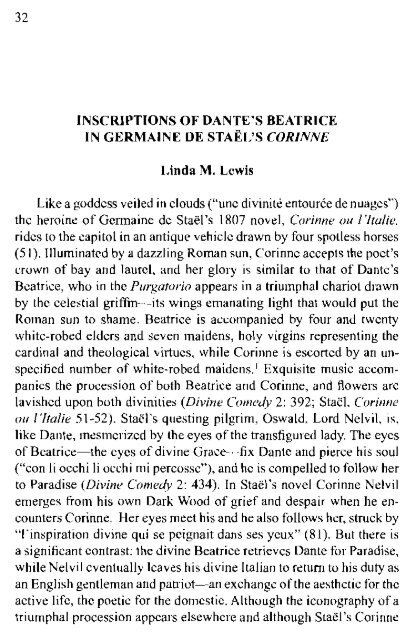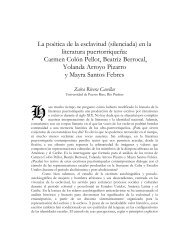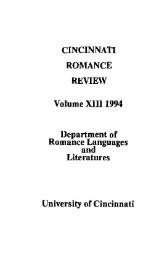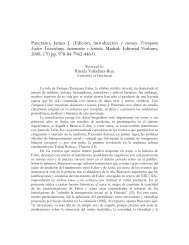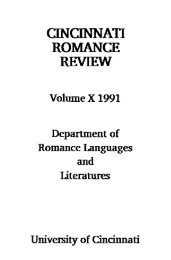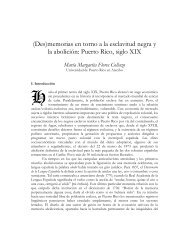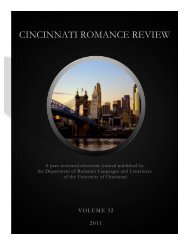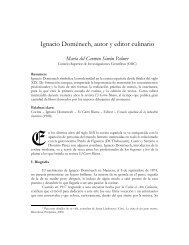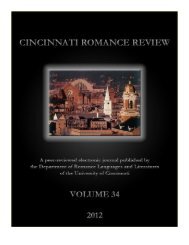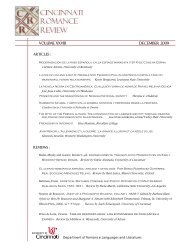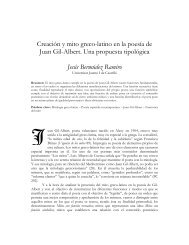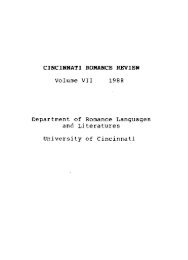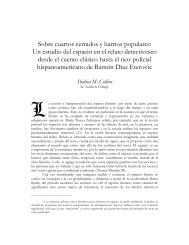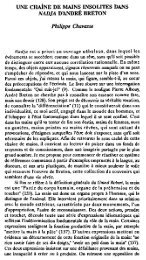INSCRIPTIONS OF DANTE'S BEATRICE IN GERMAINE DE ...
INSCRIPTIONS OF DANTE'S BEATRICE IN GERMAINE DE ...
INSCRIPTIONS OF DANTE'S BEATRICE IN GERMAINE DE ...
Create successful ePaper yourself
Turn your PDF publications into a flip-book with our unique Google optimized e-Paper software.
32<br />
<strong><strong>IN</strong>SCRIPTIONS</strong> <strong>OF</strong> <strong>DANTE'S</strong> <strong>BEATRICE</strong><br />
<strong>IN</strong> GERMA<strong>IN</strong>E <strong>DE</strong> STAEL'S COR<strong>IN</strong>NE<br />
Linda M. Lewis<br />
Like a goddess veiled in clouds ("UTIC divinile entource de Tluages")<br />
the heroine of Germaine de Stael's 1807 novel, Corinne ou ['ltalie.<br />
rides to the capitol in an antique vehicle drawn by four spotless horses<br />
(51). JIluminatC'd by a dazzling Roman sun, Corinne accepts the poet's<br />
crown of bay and laurel. and her glory is similar to that of Dante's<br />
Beatrice, who in the Purgaforio appears in a triumphal chariot drawn<br />
by the cele~tia[ griffin---ils wings emanating light that would put the<br />
Roman sun to shame. Beatrice is aCL:Ompanied by four and twenty<br />
white-robed elders and seven maidens, holy virgins representing the<br />
cardinal and theological \'irtucs, while Corinne is escorted by an unspecified<br />
number of white-robed maidens. I Exquisite music accompanies<br />
the procession of both Beatrice and Corinne, and flowers arc<br />
lavished upon both divinities (Divine Comedy 2: 392; StacL Corillne<br />
01/ ('/talie 51-52). StaN's questing pilgrim, Oswald, Lord Nelvil, is,<br />
like Dante, mcsmerized by the eyes ofthe transfigured lady. The eyes<br />
of Beatrice-the eyes of divine Grace-, ·fix Dante and pierce his soul<br />
("con Ii occhi Ii occhi mi percossc"), and he is compelled to follow her<br />
to Paradise (Divine Comedy 2: 434). In Stae}'s novel Corinne Nelvil<br />
emerges from his own Dark Wood of grief and despair when he encounters<br />
Corinne. Her eyes meet his and he also follows hcr, struck by<br />
"I"inspiration divine qui se peignait dans ses yeux" (81). But there is<br />
a significant contrast: the divine Beatrice retrieves Dante for Paradise,<br />
while Nelvil eventually leaves his divine Italian to return to his duty as<br />
an English gentleman and patriot--an exchange of the aesthetic for the<br />
active life, the poetic for the domestic. Although the iconography ofa<br />
triumphal procession appears elsewhere and although StaeJ's Corinne
is a composite of several myths of idealized womanhood, Stael who,<br />
according to Madelyn Gut\\lirth had been reading her Dante in the<br />
months prior to writing Corinne, makes rmticular use of the Beatrice<br />
allusion (Srae! 17\). Specifically, she invokes Dante by means of an<br />
icon of the Divine Lady and via a text that is a hymn to liberty, but<br />
she parts with him on the doctrine ofempire, which Dante affinns but<br />
Stad-basing her judgment on Napoleon's injustice-soundly rejects.<br />
Her inscription of Beatrice into the story of Corinne allows Stad to<br />
comment on politics as well as aesthetics and to endorse both the active<br />
and the contemplative life.<br />
The poct, artist, singer, actress, and improllisatrice of Corinne is,<br />
according to Ellen Moers, a figure of"heroinism" ofthe cult ofgenius<br />
(181). Corinne is many women and goddesses in one. She \\le
34 Inscriptions of Beatrice in Corinne<br />
his figure for the grace and wisdom of God is of the female sex. Paul<br />
A. Olson notes that Beatrice "send[s] down flame lets of fire to her<br />
earthly lover in the fann ofright desire culminating in right acts" and<br />
·'informs both the contemplative and the pragmatic active life" (158).<br />
This, however, is where Stael\ Nell/il departs from Dante's chosen path<br />
in that her Neh'il mistakenly splits the contemplative and active aspects<br />
oflife, as characterized by his love for italian and English half sisters.<br />
Nclvj] loves both sistcrs---Corinne for her scintillating personality and<br />
intelligence, Lucile for her duty and domesticity-but he sacrifices the<br />
fonner for the latter, thus failing to follow Corinne's divine c)l;ample in<br />
"right desire [...J righl acts" and fragmenting the personal from both<br />
the political and the spiritual life.<br />
In Stael's novel the English patriot Nelvil is weary oflife, numbed<br />
by war, disappointed in amour, grieved by the recent death of his father,<br />
and teetering on the precipice of hell until he beholds Corinne,<br />
who has charnled Rome as imprm'isatrice and salonnh"re. As Joan M.<br />
Ferrante comments about Dante in the Dark Wood, Nelvil is "elLt off<br />
from his family, his city, and any publie function"-··-in other words,<br />
personally and politically stranded (137). The rapt Englishman eagerly<br />
hears Corinne's instructions, not only on a((aire,\' de crrur but also on<br />
aesthetics, politics. and national character (topics ofparticular interest<br />
to Stael). With Corinne as his loving guide, Nelvil makes a progress<br />
across an Italian landseape increasingly littered with Dantean imagery.<br />
Among other scenes, for example. the lovers visit the volcano Vesuvius,<br />
where the inferno ofcrater, lava, flames, and ash are like the whirlwind,<br />
pitch, and sulphur that inspire Dante's depictions ofhell (338). Andjusl<br />
as Beatrice's divine eyes lift Dante to the bcautiful iiummit ofParadise<br />
("per 10 monte del cui bcl cacumelli occhi della mia donna mi levaro")<br />
Corinne directs Nelvil's sight upward from Vesuvius to the mountains<br />
nearer hcaven to remind him of "Ia vie lerrestre" as exchange tor our<br />
hellish c1(istence (Divine Comedy 3: 248; Corinne 339). Here Stael illustrates<br />
that Corinne is not a sensualist but, like Beatrice, a guide to a<br />
spiritual plane. But thc Anglican Nelvil cannot accept Corinne's fervent<br />
CatholieismAs he says. ':jc vois la divinitc dans la raison camme dans
I'enthousiasmc"--he sees God in rationalism as she docs in enthusiasm,<br />
Stacl's term for both Corinne's religion and her art (and an echo<br />
of the enthusiasmos that Plato labels as the poet's frenzy endangering<br />
rational thought) (274). In addition Anglicanism, British patriotism,<br />
and Lucile arc all rdated to Nclvil's sense of right being in the world.<br />
whereas Catholicism, Italy, and Corinne are, collectively, the life thai<br />
he must negate. Recalled to England to take his rightful place with the<br />
landed English aristocracy and the military, Nelvil leaves Corinne in<br />
Italy, and from the day of his departure, she begins to die.<br />
In the Pwgafor;o Dante is prepared for the vision of Beatrice by<br />
a dream of the sisters Leah and Rachel, wives of the Old Testament<br />
patriarch Jacob, and a foreshadowing of Dante's encounter with the<br />
allegorical ligures Matilda and Beatrice, who represent, respectively,<br />
the active and contemplative life. Leah, the flower-gathering vocalist,<br />
tells Dante ofthe sweet Rachel \vho sits at her mirror in selfcontemplation,<br />
while Leah adorns herself: "lei 10 vedere, e me ]'ovrarc appaga"'<br />
("She with seeing, and I \vith doing am content") (Dil'ine Comedy 2:<br />
354). Nelvil's Leah/Matilda is of course his Englisn bride, Lucile, as<br />
his Rachel/Beatrice is Corinne. Tne docile and dutiful Lucile is also<br />
the wife chosen for Nelvil by his late father, and tne son eventually<br />
abandons those captivating eyes of his Beatrice to accept the "manteau<br />
de plomb" worn by the hypocrites of Dante's l'!lerno (hypocrisy because<br />
Corinne is the great love of his life) (364).\ Upon his marriage<br />
to Lucile, Nc1vil abandons his rigorous intellectuallifc \vith Corinne<br />
in Italy and espouses vigorous military service to his nation.<br />
After Dante has learned true repentance, Matilda baptizes him in<br />
the River Lethe. Nelvil's Lethean baptism, his marriage to an English<br />
Matilda, permits him to "forget" his love affairs with foreign<br />
women-the French Mme d' Arbigny and tne Italian Corinne, but<br />
also to repent his entanglement \vith the life of the mind and soul tnat<br />
Corinne represents. StaeJ presents it as an ill-advised exchange because<br />
Corinne, like Beatrice, is prepared to guide her votary to all aspects of<br />
wisdom-cuI lura! and aestnetie but also historical and political.<br />
After his marriage Nelvil serves as a colonel in the Napoleonic<br />
35
36 Inscriptions ofBcatricc in Corinne<br />
wars, thrills to the tumult of battle, marries, becomes a father, and ends<br />
the novel living an exemplary--,·albeit unhappy----domestic life of an<br />
English lord. When peace is declared and travel is once more permitted,<br />
Nclvil, Lucile, and their child go in winter to the ailing Corinne at<br />
Florence. On their way the wintry fog reminds onc of the River Styx,<br />
while the frozen landscape that they traverse brings to mind the sheet<br />
of icc of Dante's Cocytus (pit of the Infemo reserved for the treacherous,<br />
both rolitical and religious). With Corinne Nelvil had witnessed<br />
the fiery Inferno; with Lucile he encounters the frosty one.<br />
Both the Commedia and Corinne arc, among other things. political<br />
art, and Dante is for Corinne the poet of sacred mysteries, animated<br />
"par l'cspirit des republiques" (60-61). No doubt Stael felt a bond of<br />
kinship with Dantc because both writers had, by their pol itical nctions<br />
and statements, brought down upon their heads thc disfavor of their<br />
governments, Florence and France respectively, and both were exiled<br />
(he for lifc by the Guelph faction in power, she by Napoleon for the<br />
remainder ofthc Emperor's life). In her improvisation at the Capitol,<br />
Stael's Corinne recites, "Le Dante esperait de son pocme la fin de son<br />
exiL il comptait sur la renommee pour mediateur; rnais il mourut trap<br />
t6t pour reeucillir les palmes de la patrie" l62). Thc Victorian poet L.E.<br />
Landon translates his "Chant of Corinne at the Capitol" as:<br />
Melhinks that Dante, banish'd his own soil,<br />
Bore to imagined worlds his actual grief,<br />
Ever his shades inquire the things oflife,<br />
And ask'd the poet of his native land;<br />
And from his exile did he paint a hell. (54-58)4<br />
As a Dante (or a Petrarch or Tasso) is "Ie pode vnleureux de<br />
I' independance italienne" (62). Corinne, and by extension Stael hersel1:<br />
serves as valorous poet of French independence, pcacc, and prosperity<br />
and as an enemy to Napoleon's rule. Further, D,illte's political doctrines<br />
include thc belief in self-destiny through the exercise of right<br />
reason and free will-an equivalent to Stacl's emphasis on "liberte."<br />
Yet Stael comments in Considerations sur les principllux i'v(;nements
de 10 Revolution Fronc;aise, that the "free will" of man is, under the<br />
regime ofNapo1con, merely a metaphysical question and pOintless to<br />
consider ((Euvres pas/humes 221).<br />
As noted above, Dante advocates empire as the most acceptable<br />
form of govemment because the unity of one nation-state most nearly<br />
approximates the unity that i~ in the holy Trinity-the oneness 10<br />
Which, he believes. all things rightly aspire. Furthennorc. he posits<br />
that it is within an empire that the civic virtue can best develop. In De<br />
Monarchia he holds that the goa! of human existence is the exercise<br />
of moraL intellectual, and theological virtue. Therefore, the work<br />
proper to the human species is to keep the whole: capacity constantly<br />
actualized}iJr /lwu[:hl andiar action. As the ideal state O1llows humans<br />
to thrive in both the contemplative and the active spheres, the ideal<br />
condition ofpeace provides the most conducive environment for both<br />
thought and action to prosper.' Dante suggests that a single mler, onc<br />
whose position renders him incapable of desire for still more prestige<br />
or power, can best assure universal peace (Latin Works olDal/te 141).<br />
In other words, empire exists to achieve civic perfection---in both the<br />
active and contemplative spheres. As U. Limentani observes, peace.<br />
the "leitmot!f' ofthe Monarchia, is a state in which both emperor and<br />
citizen are liberated from eupiditas (117).<br />
Furthennore, according 10 Joan Ferrante in The Politico! Vision<br />
ol"the Divine Come£(r. the Commedia itself can be read as a political<br />
allegory. and retracing the journey of the citizen from a corrupt 10 an<br />
ideal society is one way of seeing Dante'~ progress from the City of<br />
Dis to the City of God (136). From his eneounters with the assassins<br />
Brntus and Cassius and the schismatic Bertran de Born in Hell, 10<br />
the litany of negligent rulers in Purgatory, to a reunion with the noble<br />
Caeciaguida, knighl of Empire, in Paradise, Dante makes a political<br />
ascent toward the empire of God. Even Beatrice indirectly endorses<br />
the principle of empire, assuring her pupil that he may trust as gods<br />
the spirits he meets in Paradise, whereupon Justinian, the first ofthese<br />
godly speakers, defends the Roman empire as the method willed by<br />
heaven to bring all the world to its stale of peace ("redur 10 mando a<br />
37
38 Inscriptions of Beatrice in Corimw<br />
suo modo sereno") (Divine Comedy 3: 80, 3: 88). Thus Beatrice, the<br />
grace and wisdom of Gall. is also the active and contemplative life<br />
joined into one, a unity which Dante had learned from his great ma..,ter<br />
Aristotle and which his divine Beatrice also endorses.<br />
Germaine de Slael. on the other hand, attacks the politics ofempire.<br />
A monarchist whose father, Jacques Necker, served as financial minister<br />
in the government of Louis XVI, Stae] despised the Revolution and the<br />
usurper Bonaparte, who named himself emperor in PW4 and king of<br />
Italy in 1805. In Considerations, Stae] compares the Reign of Terror<br />
to Dante's Hell, each circle of torment being worse than the one that<br />
preceded it. First the nobles, then th~ priests, then talent, beauty. and<br />
goodness wer~ destroyed, she says «(Euvre.... posthllmes I]g). Then after<br />
the Terror came Napoleon, who-she elaims in Dix annees d'exilcommitted<br />
mOTe acts of arbitrary insolence ~very day of his life than<br />
any monarch of Europe would commit in a year «(Ellvre5 posthumes<br />
363). She concedes that the whole radical experiment once bathed in<br />
blood should be permitted to run its course-too great a price having<br />
been paid for the nation to tum back. She still maintains, though, that<br />
it is monarchy, not republicanism, that developed the French national<br />
character and that it is the system that the French most desire. Yet inDe<br />
fa fittera!lfre she asserts that only in free states can both genius ofaction<br />
and ofreflection be achieved ((Euvres compft~'es 2: 232, 28g-300).<br />
Stad was fascinated with th~ history ofcivilizations and the theory<br />
ofnational character. She saw modem history as having evolved in thr~e<br />
stages: feudalism marked by imoads of the bourgeoisie, the modern<br />
era despotisms, and the representative forms of government that she<br />
observed in England and in the new American democracy. Because different<br />
countries have evolved under different politi\.:al systems and in<br />
different social and religious climat~s, Stae] notes that ditferent national<br />
characters result. As demonstrat~d in Nelvil's conscience, the English<br />
character is open, patriotic. and dutiful, although rational and rigid.<br />
and-in its attitude toward women--,,-unenlighten~d.Under a monarchy<br />
and in the milieu ofthe Court, the French have developed wit, sophistication,<br />
and urbanity. Corinne explains that the Italians are without pride,
ceremony, and hypocrisy, and as a people they value genius beyond all<br />
gifts. Thus theirs is a national character that-like pre-Revolutionary<br />
France-inspires a woman's genius. One of the many flaws ofempire<br />
is that it goes against the concept of national character.<br />
While writing Corinne. Stacl's best hope for human liberty and<br />
political virtue lay in the hope of a French republic and the fall of<br />
Napoleonic empire. Surdy republicanism would be preferable to<br />
tyranny. Stae! believed in the perfectibility of humankind (as did<br />
several Enlightenment thinkers. such as Marie-Jean Condorcct and<br />
William Godwin), and she holds that throughout history humans have<br />
been moving along a continuum ofprogress. In Corinne, the heroine's<br />
references to Italian art, Etruscan through Renaissance, illustrate this<br />
progress of the human mind, while the political chaos and miasma<br />
she points out to Nelvil are the by-produCls of tyranny (136). Kadish<br />
reads the Dantean landscape that the lovers discover outside Rome<br />
as an allegory lor French warfare and politics: the "pernicious effects<br />
of [the] bad air" of Rome suggest the decline ofthe Revolution<br />
atter 179 I, just as earlier scenes of Corinne and Nelvil's Italian idyll<br />
had represented early hope for the Revolution, and just as the hellish<br />
scenes they later encounter symbolize the Terror and the Empire<br />
(118). In Stael's view the contemporary despotism of Jaeobins and of<br />
Napoleon is regressive, retarding human progress toward freedom and<br />
representative government. For all human institutions either as~ist in<br />
movement toward perfection or impede the progress toward perfection<br />
and happiness, which Stae] defines as the Good without its opposite<br />
Evil-hope without fear, liberty without license, competition without<br />
factionalism. Although the human passions of enthusiasm and ardent<br />
devotion produce creativity in all fields of artistic and civic endeavor,<br />
the passions of avarice. pride, ambition, and pettiness undermine the<br />
perfectibility to which human political institutions tend. They are the<br />
obstacles to political happiness; they steal from individual citizens the<br />
independence offree will that Dante valued and that is essential, Stael<br />
says, for any kind of individual happiness. As previously noted, she<br />
asserts that only in free states can both genius of action and of reftee<br />
39
40 Inscriptions of Bealrice in Corinne<br />
tion be united-and in this she echoes Dante, although he endorses<br />
this unity in a holy Roman empire, while she hopes it can be attained<br />
in a republican France. Under despotism, however, even art makes no<br />
progress because the artist serves the state--unlcss, ofcourse, tbe artist<br />
is "I 'esprit des rf!publiques" like Dante or Germaine de Sluel.<br />
In Corinne tbe condition of Italy, then, simultaneously represents<br />
both itself and the condition of the Napoleonic empire. Reflecting<br />
upon the Italian national character, Corinne reminds Nelvil that Italy's<br />
great achievements, as well as her great artists and poets, were of the<br />
past and that currently Italy suffers politicallY because she is neither<br />
unified lind nor free. Liberated from the ignorance, envy, discord, and<br />
sloth to which fate has reduced her, she l;ou\d again bccome great,<br />
but self-interest, not national pride, seems to be the ruling principle<br />
(57; 71). Because the representative republics of Europe and the New<br />
World arc free-that is, they have attained the third stage of human<br />
destiny---they are nations of the prcsent. Becausc France and Italy urc<br />
under tbe despot, they arc frozen in the second stagc--their glory now<br />
being dead, their future in doubt.<br />
When Corinne and Nelvil arrive in Naples, they find the worst<br />
excuse for government that they have yet seen. Marie-Claire Vallois<br />
rightly notes that their excursion to Naples and beyond is a descent to<br />
Hell and Purgatory (144). The Neapolitans are unattractive because they<br />
arc dullards-indolent and sluggish. In Dantean language, one w·ould<br />
say they are in the bolgia of the Slothful. While Nelvil, an observant<br />
but critical citizen of a third-stage nation, remarks that people acquire<br />
the government they deserve, Corinne responds that rather the government<br />
has determined the character of the people-a viewpoint that<br />
more closely matches Stael's. Since the government ofNaplcs rules as a<br />
sultan and citizens experience the confinements ofa seraglio, naturally<br />
they behave as odalisques (neither active nor contemplative). Stael<br />
and her readers make note that the code of Napoleon is a throv.,·t:lack to<br />
despotism, not a move forward toward a representative government,<br />
and therefore the French citizens will behave as the Neapolitans, not in<br />
energetic, active commitment to the state as Stael finds in representative
epublics like England and which Nelvillater demonstrates, albeit al<br />
the cost of his heart and soul.<br />
While Corinne is a statement on the political repression of the<br />
empire, it also ~crves as Stael's version of gender politics (a cause not<br />
on the agenda ofDante's Beatrice). National character counts not only<br />
for civic behavior, but also for the expectations and behavior of women.<br />
Because the English political system is open and frcc, English men like<br />
Nelvil fecI called to duty without compulsion; at the same timc--as<br />
Sta~n repeatedly notes in Corinne-English women must bloom in<br />
the shade. English men have dignity: English women, only modesty<br />
(447). Stad suggests that in places in which the national conventions<br />
deny respect to women, females too behave like odalisques rather than<br />
like a Corinne. As the saloll of Mme Necker, Stael's mother, permitted<br />
young Germaine Necker to become a precocious intellectual, mother<br />
Italy allowed Corinne to develop into pythoness, sibyL and Beatrice.<br />
Stael sees the condition ofwoman as one telltale sign of the progress<br />
of nations on their road to perfection, and here again Napoleon fails.<br />
She charges that Napoleon hates brilliant women, and certainly he does<br />
hate "cette hwpie" whom he exiled.<br />
Parallel to Dante's Beatrice in the shaping of Stael's Corinne is<br />
Virgil's Cnm
42 Inscriptions of Beatrice in Corinne<br />
a foreign Dido luring him to a Carthage of sensuality. When Nclvil<br />
abandons the wisdom of his Sibyl for the duty that his English nature<br />
requirc:-; 0 f him, however, the prophetess is silenced: "La Sibyllc ne<br />
rend plus d'oraclcs; son g.enie [...Jcst fini" ( 562).<br />
Stael's protagonist, although born of the Enlightenment, is generally<br />
considered a passionate Romantic, as is her creator. Claire L.<br />
Dehon says, "on connait Ie role de Mmc de Slae] dans ]'elaboration de<br />
]a penscc romantiquc," and Gutwirth notes that Corinne "laY[5] claim<br />
to the ambient Romantic individualism," that she is "grandiloquently<br />
neoclassical in the style afher person, but Romantic, both in the dialectic<br />
afher character and [...Jthe unreconeiled nature ofher revolt against<br />
the world" (Dehon I; "Corinne and Consuelo as fantasies of Immanence<br />
23; "Mme de Stael's Debt to Phi:dre: Corinne" [75). It should<br />
be recalled that Stael is just as much a child of the Enlightenment as<br />
is the Nclvil who can respond only to a religion of rationalism. While<br />
"j'enthousiasme" or "vivacitc de l'esprit" is an essential element of<br />
Corinne's art, religion, and patriotism, she considers herself a rational<br />
creature (55). Similarly, Statl's aesthetics are those ofa Romantic, her<br />
discourse that of a rationalist. For example treatises on government,<br />
justice, literature, and history appeal to reason, and a story (perbaps<br />
apocryphal) narrates that she onee commented to Napoleon, "I should<br />
prefer that you judge me worthy to talk reason with you" (Corinne;<br />
m; l'a~y ix). In Stael's philosophy, it should be recalled, enthusiasm<br />
inspires art, love, and patriotism, but the passions ofavarice, pride, and<br />
ambition (those punished in Dante's Inferno) destroy human happiness.<br />
Therefore passion alone is an ineffective ruler. Corinne's rational<br />
diseour5e on Rome's fon)1t~r civic virtue and Naples's current moral<br />
lassitude arc intended to reveal her as an insightful student of history<br />
and politics. So much so that Nelvil is ovefVIhelmed, remarking that<br />
the highest destiny of man or woman is not "l'cxcreice dcs facultcs<br />
intclleetuelles" (343). Neither in political, aesthetic, nor metaphysical<br />
thought does Siael want her reader to admire Corinne's passion at the<br />
expense of her reason.<br />
In Michel Foucault's theOly the episteme of the seventeenth and
eighteenth centuries was that of order, taxonomy, and classification,<br />
while al the brink of the nineteenth century new theories aflabor, life,<br />
and language appeared as "transcendentals" that "toppled the whole of<br />
Westem tbought" (238). Foucault posits, "The fundamental code~ of<br />
a culture-those governing its language, its schemag ofperception, its<br />
exchanges, its techniques, its values, [he hierarchy ofits practices--establish<br />
for every man ... the empirical orders with which he will be<br />
dealing and within which he will be at home" (xx). Nclvirs hierarchy<br />
insists upon duty at the apex-duty in maniagc, chauvinism, patriarchy,<br />
and religion. In Foucault'5 thought, however, there exists between eras<br />
a disequilibrium or rupture, and Stael's Corinne seems to be caught in<br />
such a fault line between the Enlightenment past and the post-Classical<br />
episfeme. While Nclvil decides to have both feet restored to the finn<br />
foundation of reason, duty, and order, and his eyes set to the future,<br />
Corinne appears to be on shifting ground. She is pious but ardent, meek<br />
but vivacious, rational but passionate, made forjouis.I'ance but dying<br />
of sorrow. Nelvil cannot conceive of Corinne as a woman for the political<br />
future, bUI as a reminder of a dying era that cannot be restored.<br />
At the Capitol Corinne acknowledges that Rome's--and by implication<br />
haly's--glory is with its glorious anees10rs in the 10mb ("Rome<br />
maintenant n'est-cite pas la patrie des tombeaux.!") (65). The present is<br />
the tyranny ofNapoleon's empire, not the freedom of Dante's utopian<br />
one. The turbulence of Europe's history prevents her from becoming<br />
for Nelvil what Beatrice is f(lf Dante---the contemplative and active life<br />
united. To Stael the time is out ofjoint when reason and enthusiasm<br />
cannot be coterminous in love and in politics.<br />
Stad's inscriptions ofBeatriee arc not window dressing. Beatrice<br />
serves Dante as the Wisdom of God, the contemplative and active<br />
life in a hannonious whole, and the potential ofutopian empire. As a<br />
modern Beatrice, Stae! offer~ Corinne as sibyl ofwisdom and as ideal<br />
balance of the eontemplati"e and 1he active, but as a negation of the<br />
current world empire. Throughout Dante's works, the one who would<br />
seek spiritual bliss must gaze into the eyes ofthe Divine Lady ofglorious<br />
light ("faecia che Ii occhi d'esta donna miri"), for the eyes are the<br />
43
44 Inscriptions of Beatrice in Corinne<br />
pathway to the soul, and Beatrice's eyes, in particular. are filled with<br />
the light of God (1/ Conv;vio 34). But unlike Beatrice, who unveils<br />
herself to the hymn of an angelic choir singing "Volgi, Beatrice. volgi<br />
Ii occhi santi"-'turn your holy eyes on your acolytc'-Corinne veils<br />
hersclfbeforc the face of her fanner acolyte who has proven himself<br />
blind to her vision (Divine Comedy 2: 40S).<br />
NOTES<br />
Bethany College<br />
I That Corinne mirrors Beatrice has been noted by several critics,<br />
for example, Marie-Claire Vallois (FictionsjemininL'x 144).<br />
1 For a detailed description of the female figure as icon of the<br />
Revolution. sec Madelyn Gutwirth, The Twilight olthe Goddesses:<br />
Women and Representtl/ion in (he French Rerolwionary Era (252<br />
84).<br />
1 The: allusion to the lead mantle of Dante's hypocrites is actually<br />
spoken by Corinne to describe: the marriage of her father to her English<br />
belle-nu;re, Lucile's mother, but naturally it also fits the mirrored<br />
choice ofNelvil to marry Lucile.<br />
4 Translation by the English poet LE.L. (Letitia Landon) in Isabel<br />
Hill's translation of Statl 's novel (26).<br />
~ According to A. P. d' Entrcves, the connection hetween peace<br />
and unity is not original to Dante, and was likely encountered in St.<br />
Augustine's Ci~y qfGod (Dante as Political Thinker 31).<br />
WORKS CITED<br />
Dante Alighieri. The Banquef. Trans. Richard H. Lansing. New York:<br />
Garland, 1990. Tram. of If Convivio.<br />
---. The Dirine Comedy qfDanle Alighieri. Trans. John D. Sinclair.<br />
3 vols. London: Bodley Head, 1958.<br />
---, A Trallslation ofthe Latin I-J.·orks qlDmue Alighieri. Trans. A. G.
FerreTs Howell and Philip H. Wickstced. London: J. M. Dent,<br />
1904.<br />
Dehao, Claire L. "Corinne: Une artiste hcroYnc de roman." Nine<br />
teell1!J-Century Frcncll Studies 9 (19S0): 1-9.<br />
d'Entreves, A. P. Dante as Political Thinker. Oxford: Clarendon,<br />
1952.<br />
Ferrante, Joan M. The Political Vision o!,the Divine Comedy. Princeton:<br />
Princeton University Press, 1994.<br />
Foucault. Michel. The On/a o./Things: An Archaeology of/he llu<br />
man Sciences. New York: Random House, 1970.<br />
Gutwirth, Madelyn. "Corinne and ConslIe{o as Fantasies of Imma<br />
ocoee." George Sand Studies 8 (19~n~87): 21-27.<br />
---. 1Ivfadame de Stael, Novelist: The Emergence a/the Artist as U'lJman,<br />
Urbana: University of Illinois Press, 1978.<br />
---. The Twilight vIllie Goddesses: mnnen and Representation in the<br />
French Revolutionary Era. New Brunswick, N. J.: Rutgers<br />
University Press, 1992.<br />
"Mme de Stael's Debt 10 Pl/(Vre: Corinne." Studies in Romanti<br />
ci",,3 (1964): 171-7/\<br />
Kadish, Doris Y. "Narrating the French Revolution: The Example of<br />
Corinne." Germaine de Sluel: Crossing the Borders. Ed.<br />
Madelyn GUlwirth, Avriel Goldberger, and Karyna Szmurlo.<br />
New Brunswiek, N. 1.: Rutgers University Prc:'is, 1991.<br />
Limentani, lJ. The Mind ofDante. Cambridge: Cambridge Univer<br />
sity Press, 1965.<br />
Moers, Ellen. Literaly Women. Garden City, N. Y: Doubleday, 1976.<br />
Olson, Paul A. The Journey 10 a'"isdom: Setf-Education in Patristic<br />
and Medieval Literature. Lincoln: U ofNebmska P, 1995.<br />
Stael, Germaine de. Corinne: or, Daly. Trans. Isabel Hill. New York:<br />
A. L. Burt, ll. d.<br />
---. Corinne olll'Italie. Ed. Simone Balaye. France: Editions Gallimard,<br />
1985.<br />
---. (Euvres compf(~tes de Madame la Baranne de StaN-Holstein. 2<br />
vols. Geneve: Slatkine Reprints, 1967.<br />
45
46 Inscriptions of Beatrice in Corinne<br />
---. (Euvres posthttmes de ."Madame fa Baronne de Stai4-Holstein. Ge<br />
neve: Slatkine Reprints, 1967.<br />
Vallois, Maric-Claire. Fictions!erninines: ."M"me de .s'/at;1 dIes voix<br />
de fa S'ibylle. Saratoga, Ca: Anma Libri, 1987.


